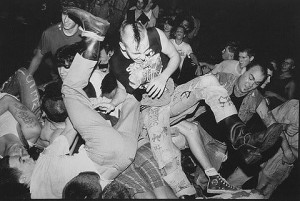 RUNNING A MUSIC VENUE COMES WITH MANY STRINGS ATTACHED. While a main concern is booking quality bands and getting a paying audience in night after night, there are many other considerations that a venue owner must deal with every day. This month’s Legal Pad looks into venue ownership, age restrictions, and a few other legal dilemmas.
RUNNING A MUSIC VENUE COMES WITH MANY STRINGS ATTACHED. While a main concern is booking quality bands and getting a paying audience in night after night, there are many other considerations that a venue owner must deal with every day. This month’s Legal Pad looks into venue ownership, age restrictions, and a few other legal dilemmas.
Age Restrictions on Shows: There is a cost/benefit analysis that every venue owner must calculate when deciding whether to enforce an age restriction on a show. Generally, the higher the age restriction, the lower your liability; if everyone at your show is above the age of 21, there are less concerns about underage drinking. If everyone is over 18, there are fewer concerns about underage drinking and minor liability. However, if you put too many caps on age, your audience pool reduces significantly, depending on the band’s draw and demographic.
Penalties for Serving a Minor: There can be hefty penalties to serving alcohol to a minor. This doesn’t even technically mean that you or your staff services the minor. If a minor is found on premises drinking (even if it’s given to him/her by a friend), you could be held liable. Penalties often arise from a compliance check conducted by local police or the state liquor licensing authority. Some venues are cited for underage drinking secondary to an inciting act (alcohol poisoning, fighting, etc) where police are called and a violation is discovered later.
In Massachusetts, for example, serving a minor can have multiple repercussions, including civil penalties, jail time, and suspension or revocation of your venue’s liquor license. Mass. General Law, Chapter 138, Section 34 regulates penalties for sale or furnishing of alcohol to a minor, with penalties being a fine of $2,000 and jail time of up to one year. More often than not, however, it is the local town or city that will issue the penalty for problems with underage drinking. Generally, he penalty will come in the form of license suspension (days or weeks for repeat offenders). License suspension can cripple your business, particularly when bands are booked early and tickets are sold months in advance.
Ways to limit your liability. Whether you have bought your own venue, are renting a space, or are putting together a concert off-site, there are several other ways to limit your personal liability:
IDs: Check identification at the door, not the bar. If your show is 21+, no one underage is allowed admittance. Front door ID checks also take the burden off of your bartenders to check IDs at every transaction. If your show is 18+, make sure to have unique or custom wristbands for everyone over 21 years of age. Markers and stamps are easily duplicated and wear off easily. Also determine a strict policy on the types of identification that is allowed at your venue. A safe bet is passports or a valid license from the state you are in. The less familiar your security is with the format, the more vulnerable your venue is to fake IDs.
Security: Have your security detail wearing the same outfit or uniform, with a shirt or armband clearly identifying them as security. Have regular sweeps through the crowd looking for underage drinking and signs that patrons have been over served. Make sure your bartenders are aware of intoxicated patrons and have them safely escorted out of the building and tended to as needed.
LLC: Whether you own a venue or are setting up a few shows, do it through a business entity. Although your selection of a corporate entity will vary depending on your needs, the most popular entity for venues is the Limited Liability Company, which are often used because they are less complicated to maintain and provide liability protection coupled with tax advantages less formal than corporations. An LLC protects you from liabilities associated with the business (meaning that you are not personally responsible for any debts or claims against the business). Essentially, with an LLC a debtor could come after the venue’s assets but not – for example – your car or home. LLC requirements vary from state to state. To check out options for forming an LLC where you live, go to www.nolo.com, search “LLC” and click on your state.
Insurance: Make sure to have a general liability policy and a policy that insures your company for personal injury on site. This is probably the insurance most often used by bars, nightclubs and music venues due to the nature of the beast. Try exploring online options. New York-based MusicPro Insurance (www.musicproinsurance.com) has an informative and user-friendly website that makes insurance selection easy, especially if you are only putting on a small number of shows. If you own a venue, opt for a blanket policy instead, which covers the property at all times.
Adam Barnosky is a Boston-based attorney and writer. For industry trends, legal updates, or to request an upcoming Legal Pad topic, find him on Twitter @adambarnosky.
DISCLAIMER: The information contained in this column is general legal information only and should not be taken as a comprehensive guide to copyright law. Consult your attorney for all specific considerations.
